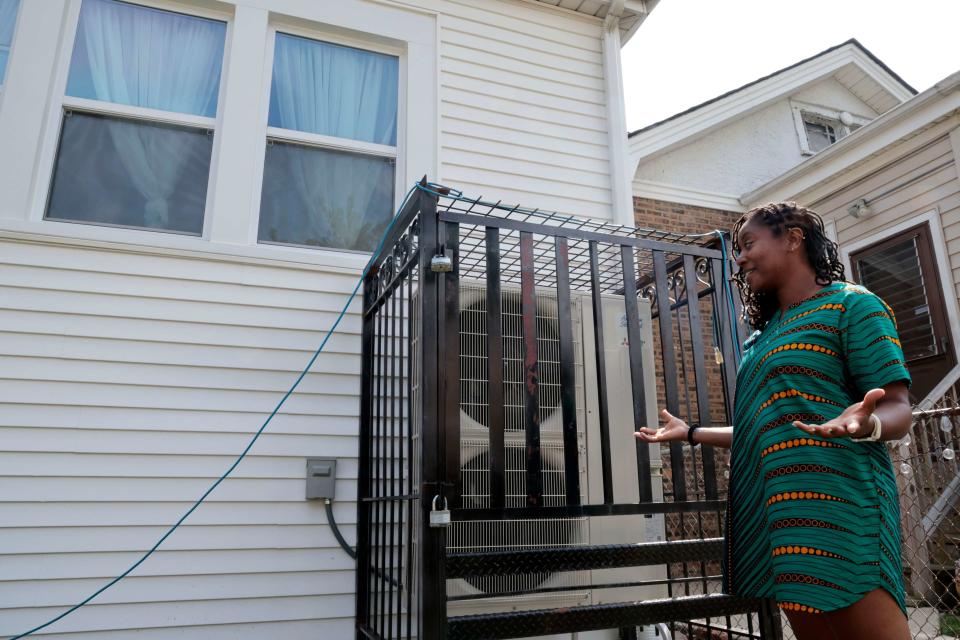Chicago to consider an ordinance that would effectively ban natural gas in new buildings
An ordinance that would fight climate change by effectively banning the use of natural gas in most new buildings is headed to the Chicago City Council.
The Clean and Affordable Buildings Ordinance will be introduced Wednesday, according to Ald. Maria Hadden, a sponsor of the measure.
The ordinance sets an emissions standard that natural gas can’t meet and opens the way for the electric heat and appliances that play a key role in most plans to slash greenhouse gas emissions and avert the worst effects of climate change.
“This is a matter of real survival and the future of our city — and especially our economic future,” said Hadden. “We’re being forced in this direction by nature, but also by policy and by business and industry. People are making these decisions because it’s economical, it’s healthier, it’s safer.”
The proposed ordinance comes at a time when cities are increasingly moving toward electric heat and appliances in new buildings, in an effort to meet ambitious local, state and national climate goals.
New York, Los Angeles and dozens of smaller cities already have measures in place that limit or prevent natural gas use in new buildings.
The American Gas Association, a trade organization, responded that natural gas has been key to meeting the nation’s environmental and economic goals.
“From providing affordable energy to consumers to driving down emissions, the benefits this fuel has for our nation are tangible and impossible to ignore,” American Gas Association President and CEO Karen Harbert said in a statement. “Any push to ban natural gas in Chicago would raise costs to consumers, jeopardize environmental progress and deny affordable energy to underserved populations.”
She said that the American Gas Association will continue to work to provide consumer choice, affordable energy and jobs.
Supporters of the proposed ordinance include consumer advocates concerned about high gas bills in Chicago, as well as environmentalists and the Illinois Green Alliance, which represents members of the state’s green building industry.
Citizens Utility Board Executive Director Sarah Moskowitz cited a 2022 analysis performed for the Natural Resources Defense Council that found that Chicagoans could save roughly $11,000 to $24,000 over 20 years by ditching natural gas and going all-electric at home.
“Status quo with regards to heating in Chicago is unsustainable in almost every sense of the term,” Moskowitz said. “People’s gas bills are already extremely high, the gas utility is trying to get rate increases, people are paying a minimum of $50 a month before they even use any gas, and we have vast swaths of the city structurally unable to afford their heating bills.”
Peoples Gas, the natural gas utility that serves Chicago, issued a statement saying, “We believe this proposed ordinance is a terrible idea for Chicago. It would increase costs and risk reliability for everyone, especially during the coldest days of the year like we are seeing this week.”
The statement went on to say that making homes use all-electric heat would cost Chicagoans two times more than they would pay for natural gas, and emissions might go up because renewables still provide less than 4% of the electricity used in Chicago on any given day.
ComEd, which serves northern Illinois, gets 4% of its electricity from wind energy, 1% from solar power, 1% from hydropower, and 33% from nuclear power, a zero-emissions energy source, according to a recent environmental disclosure report. An additional 42% of electricity is supplied by natural gas and 18% is supplied by coal.
Illinois Green Alliance Executive Director Brian Imus said building decarbonization — the move away from fossil fuels to electricity — is a national trend.
“An ordinance like this really positions Chicago to be a national leader and be more competitive,” he said.
The ordinance prohibits the combustion of any substance that emits 25 kilograms or more of carbon dioxide per million British thermal units of energy, the same standard New York City set in a law enacted in 2021.
Some buildings and equipment would not have to meet the new emissions standard, including hospitals, research laboratories, emergency backup power generators and commercial cooking equipment.
Jamie Johnson, founder and CEO of Verde Energy Efficiency Experts in Chicago, installs heat pumps at existing buildings, so the proposed ordinance, which applies to new buildings, wouldn’t affect him directly.
Nevertheless, he said, he’d benefit, due to the impact on the local green building industry. More projects would mean more trained workers in Chicago, more sources for supplies, and more competitive prices, he said.
He noted that he has 30 full-time employees, up from zero when he started his business about 14 years ago.
“This is an industry that can really create a lot of jobs in Chicago,” he said.


